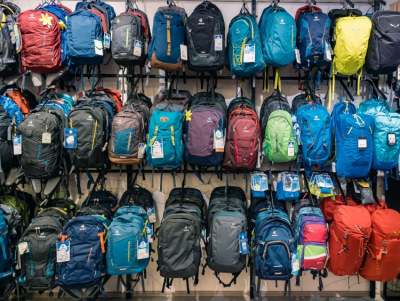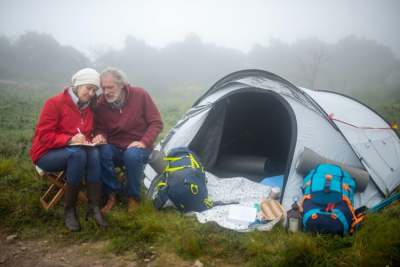Being outdoors is often promoted as being good for our health and wellbeing, and having the right clothing and equipment is essential if you are to enjoy the outdoors in all weathers, and in some situations, be safe. We review the ethics of the clothing you may buy in our outdoor clothing guide and our sportswear guide and here, we turn to where you are likely to buy it from: the outdoor clothing and sports shops.
Sports and outdoor retailers mostly sell a range of different brands, sometimes alongside own-brand items. They are often ‘one-stop’ shops selling everything from sports clothing to tents to climbing nuts, and exist both on the high street and online.
Only about a third of the brands in our outdoor clothing guide have their own physical shops. We have included Alpkit and Patagonia in this guide. If buying in person, most of us will visit a retailer to compare options and try items on.
How ethical are mainstream outdoor clothing shops?
Unfortunately, ethical policies amongst the retailers are generally not impressive. This shopping guide is remarkable for the incredibly low scoring brands across most that we reviewed.
The top scoring general retailer in our guide only gets 24 out of 100 whereas the top scoring outdoor clothing brand scores 81.
It may be better to decide on your preferred clothing brand and get it straight from them if this is possible. Most brands have online outlets but Alpkit and Patagonia both also have physical shops.
Which outdoor clothing and sports brands are in the guide?
We've included all the big names you would expect to see and which are on the high street, such as Sports Direct, Decathlon, Mountain Warehouse, Trespass, Millets and Blacks, along with other smaller chain stores and some online sports retailers. We have also included two companies that have shops selling their own brand - Alpkit and Patagonia.
As you'll see below, several of the big name brands are actually owned by a handful of companies.
Sports Direct was the biggest player in the UK sports and outdoor shops market, but has been overtaken by JD Sports (which includes Blacks, Millets and Go Outdoors). Between them they accounted for over 60% of the market in 2019.
How eco friendly are outdoor retailers’ own brands?
As well as selling products made by other companies, many of the retailers in this guide also sell own-brand products. All of the money spent purchasing these products will go straight to the retailer. Because of the comparatively low scores achieved by retailers relative to brands in our outdoor clothes shopping guide, you may want to avoid the following own-brand labels:
| Retailer | Own-brand labels |
|---|---|
| Decathlon | Forclaz, Quechua, Simond |
| Sports Direct, Field & Trek | Karrimor, Everlast, Gelert |
| Mountain Warehouse | Mountain Warehouse |
| Nevisport, Trespass | Trespass |
| Blacks, Millets | Blacks, Brasher, Eurohike, Freedom Trail, Hi Gear, North Ridge, Peter Storm |
Who owns what outdoor clothing brands?
As well as some retailers having several different own-brand labels, some of these brands are owned by bigger companies. Two of the biggest are:
- JD Sports: owns Blacks and Go Outdoors. But, JD Sports itself is 52% owned by the Pentland Group, which also owns Berghaus, Speedo, Ellesse and others.
- Frasers Group: owns Sports Direct, Gellert, other associated own-brands noted in the table above, along with other clothing brands.
Low-scoring retailers across several categories
Most of the retailers in this guide were universally low scorers and rated poorly for a number of elements in our score table.
- All but Decathlon, Alpkit and Patagonia scored 0/100 for use of animal products.
- Most scored very poorly for company ethos with Mountain Warehouse, Cotswold, Snow and Rock, Nevisport and Trespass scoring 10/100, most of the rest scoring 0. Alpkit and Patagonia stand out as high scorers in this category
- Use of PFAS - Alpkit and Patagonia got nearly top marks here but most scored very poorly with only Decathlon having a target date to phase them out; the rest had no target date and/or virtually no discussion about them.
Local independent outdoor clothing retailers
Although we haven’t been able to rate them all in this guide, your best bet if buying new is likely to be visiting a local independent store. While they’re not guaranteed to have stronger policies, at least you’re supporting your local economy.
As well as professional fittings, some independent retailers will provide you with guidance on care and repairs, and ‘stretching services’ for boots if they’re pinching in one or two places. One retailer, Foothills in Sheffield, even offers free guided walks most Wednesdays.
Buying secondhand outdoor clothing and equipment
When buying outdoor gear, our key recommendation is to look for ways to buy secondhand. We haven’t rated secondhand retailers in this guide, and unfortunately many (e.g. eBay) are not renowned for their ethics. However, buying secondhand is a great way to address some of the environmental and human rights impacts of the actual item you’re purchasing.
We give recommendations for buying secondhand in our outdoor clothing guide.
Plus we have rated some secondhand shops in our ethical clothing Guide. See also our article on charity shops.




